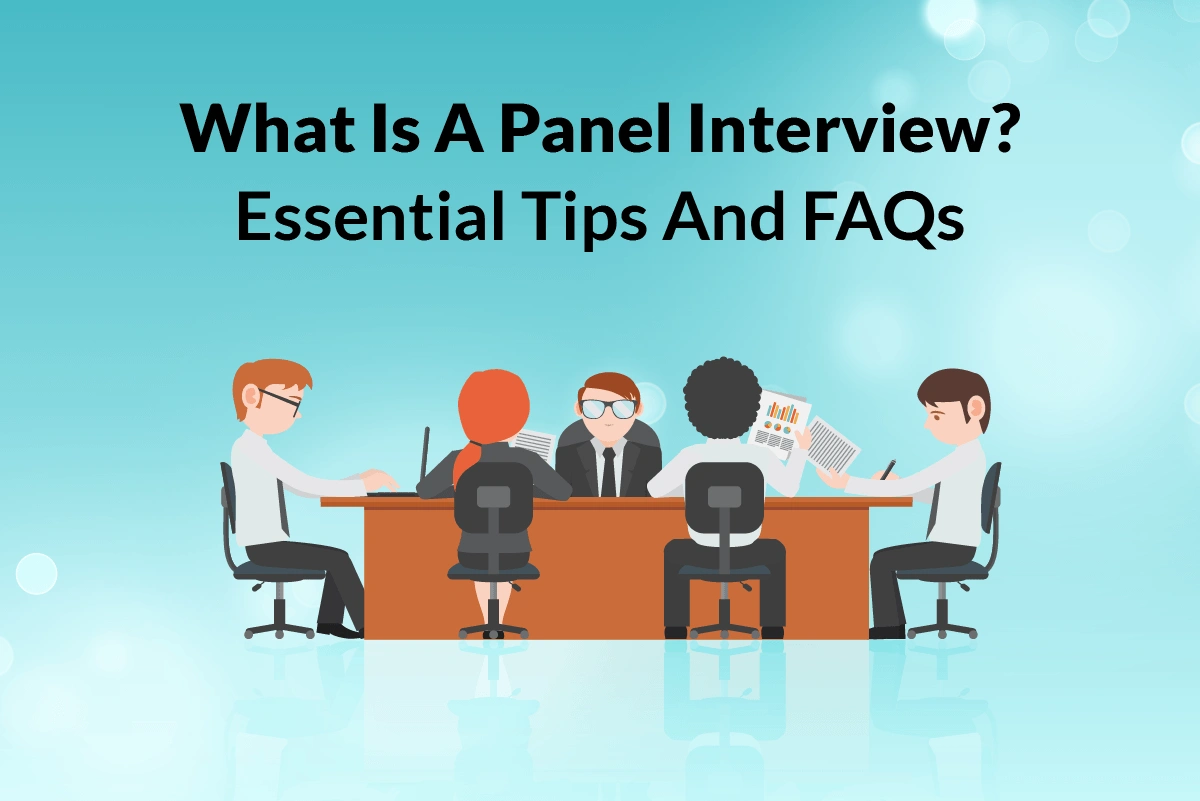Interviews help employers assess the candidates’ qualifications and decide if they are a good fit for the position. A panel interview is one of the interview types used by many companies. What is a panel interview? To understand a panel interview, we will explain all aspects of it below. We will answer some more questions for employers as well!
What Is A Panel Interview?
A panel interview is a type of interview conducted by two or more interviewers. The people on the panel will be managers, peers or have important positions in the company. They could be a potential supervisor, future team member, a human resources representative, or even a manager.

How Does Panel Interview Works?
The panel interview works by having each panelist ask the potential candidate a list of questions to understand their talents, personalities, experience, strengths, and weaknesses, assessing whether they are a good fit for the company. Additionally, the interviewer may present case study scenarios to evaluate the candidate’s competency.
The company will get the desired answers at the end of the panel interview to decide if the candidate is suitable for the job. If you want to know why companies use panel interviews, continue reading below!
Evaluating candidates’ strengths and weaknesses by hiring rubric!
Why do companies Prefer Panel Interviews Over Personal Interviews in the recruiting process?
The most fundamental action to making a business become better is to choose the right person for the right position.
These are 5 reasons why companies use panel interviews in the recruiting process instead of personal interviews:
- Eliminating personal biases about candidates
- Organizing more easily
- Recognizing the potential of the candidate
- Improving the accuracy of the interview results
- Allowing candidates to understand the work and how to interact with future colleagues
Eliminating personal biases about candidates
If the interview has only one interviewer, it will be easier to introduce one person’s bias. From there, the questions posed can further confirm the bias and derail the interview. From racial profiling to gender discrimination, an individual interviewer can be biased in so many ways. A structured interview with multiple participants minimizes the impact of biases.
Organizing more easily
A panel interview will have questions raised by the panel. This set of questions and plans can be used with all of the candidates. Therefore, it would be easier to hold structured interviews in the presence of a panel than to hold individual sessions where a candidate could get repeat questions and only one person decides whether a candidate is fit for the job or not.

Recognizing the potential of the candidate
Many studies by human resources experts in the United States indicate that people can better reveal their talents under pressure. Having a candidate face multiple interviewers can help them reveal hidden strengths and weaknesses.
Improving the accuracy of the interview results
Questions from multiple panelists can provide the most accurate candidate feedback, resulting in the best possible decision for their company. Together they can evaluate the candidate’s answers to identify qualifications and the suitability of the candidate for their company culture.
Allowing candidates to understand the work and how to interact with future colleagues
When participating in panel interviews, candidates have the opportunity to interact with employees they’ll interact with on a daily basis. In the counter-questioning part of the interview, the candidate can gain more information about what it’s like working at the company. If organized professionally and prepared, candidates have the opportunity to really understand the team dynamics and culture.

Although participating in a panel interview makes candidates face more pressure, it can also shorten the hiring time. Instead of holding a series of individual interviews, panel interviews speeds up the hiring process both candidates and employers.
Many companies argue that panel interviews are more effective than personal interviews because they provide a realistic experience to candidates and create a fair hiring process for all candidates. However, panel interviews require adaptability and quick thinking for the candidate and employer both, so you may struggle under interview pressure. If you’re the employer, here’s how to deal with it:
How To Conduct A Panel Interview?
To conduct a panel interview, the company needs a detailed plan for each interview step. You can refer to our panel interview guidelines below:
- Step 1: Choose interviewers for the panel.
- Step 2: Train the panel.
- Step 3: Select interview questions.
- Step 4: Select initial candidates for interview.
- Step 5: Interview candidates.
- Step 6: Discuss and assess candidate qualifications and if a good fit, recommend to hire.
Generally, the first step in the process is:
Step 1: Choose the interviewers
The company can choose from 3 to 5 people to participate in the panel during the interview. The panel will include representatives who are veteran employees, peers, or managers.
- Human Resources Representative
- Hiring Manager
- Managers related to the department that needs to hire personnel
- Future team members

The hiring manager can act as the interview lead. The rest of the panel will act as subject matter experts (SMEs) for areas compatible with the candidate’s skills and experiences.
Step 2: Train the panel
Panel members must identify what they bring to the panel in terms of their work’s focus and relevant knowledge, skills, or abilities (KSAs). Then, everyone should be on the same page on the minimum requirements candidates need to pass. Train the panel to ask open ended questions and how to form follow up questions. Most importantly, make sure they are all aware of what questions are illegal to ask such as age, pregnancy status and, in some states, current salaries.
Step 3: Select interview questions
After setting up the panel and conducting training, the interview panel members must choose appropriate questions. These questions are not the same for each panelist and should draw out the talent and experience of the candidate. By each panelist focusing on their area of expertise, the person asking the question can gauge when the answer needs further explanation.
Step 4: Select initial candidates for interview
You will select the grouping of candidates based on whether their resume matches the company’s selection criteria. Narrow down the candidate pool at this stage to 3-4 candidates. Only the very best of the pool should make it to this stage.

Step 5: Interview candidates
During the interview, the panel will take turns asking questions. Do not ask questions in a rush, but ask in turn and have a strategy according to the plan. In addition to asking the candidate questions to assess their experience, knowledge, and potential abilities, you must also answer the candidate’s questions about the company before the interview can end.
Step 6: Discuss and assess candidate qualifications and recommend to hire
After dismissing the candidate, panel members will spend 10-15 minutes discussing and evaluating the qualifications of the candidate and making appropriate recommendations. Everyone will have their own opinion about the candidate, so someone should guide the panel towards creating an objective view to identify who best benefits the company.
Questions To Ask Candidates In a Panel Interview
Asking candidates questions is the most important part of a panel interview. Knowing how to ask and organize questions will help panelists get more information about the candidates.

Here are some questions you should ask in a panel interview:
- Tell me about yourself.
- Where do you see yourself in three to five years?
- What is your greatest strength?
- What is your greatest weakness?
- Why do you want to work here?
- Why should we hire you?
- Describe the best team you’ve ever worked with.
- How would a colleague describe you?
- How do you handle tight deadlines for projects with minimal supervision?
- Imagine that you are introducing a new policy to your co-workers or employees, and you face opposition. How would you handle it?
- Describe a time when you were working on a team project and had a conflict in the group. How did you handle the situation?
- Tell us about an occasion when you had to deal with a difficult client. How did you prevent the situation from turning worse?
- What is the worst mistake you made in your previous position? How did you remediate this?
- Do you have any questions of your own?
Conclusion
In this article, we have helped you answer the question, “What is a panel interview?”. The information we share about a panel interview can help your company’s interviews and recruitment be more effective. A properly structured and effective panel interview will help the company recruit the perfect employees.
Thanks for reading!
References
- C22. (2014). INTERVIEWS II: THEORIES AND TECHNIQUES. C22. Retrieved from https://courses.aiu.edu/Theory%20and%20Technique%20of%20the%20Interview%20ll/Session%2010/INTERVIEW%20THEORIES%20AND%20TECHNIQUES%20II%20-%20SESSION%2010.pdf
- CHARLESTON, T. C. (2017). Guidelines Interview Panel. Charleston: THE COLLEGE OF CHARLESTON. Retrieved from https://hr.cofc.edu/supervisor/assets/onboarding/Panel%20Guidelines.pdf
- OUC. (2006). CONDUCTING THE INTERVIEW. Florida: OUC. Retrieved from https://hr.ok.ubc.ca/wp-content/uploads/sites/71/2018/03/Conducting_the_Interview23154.pdf

